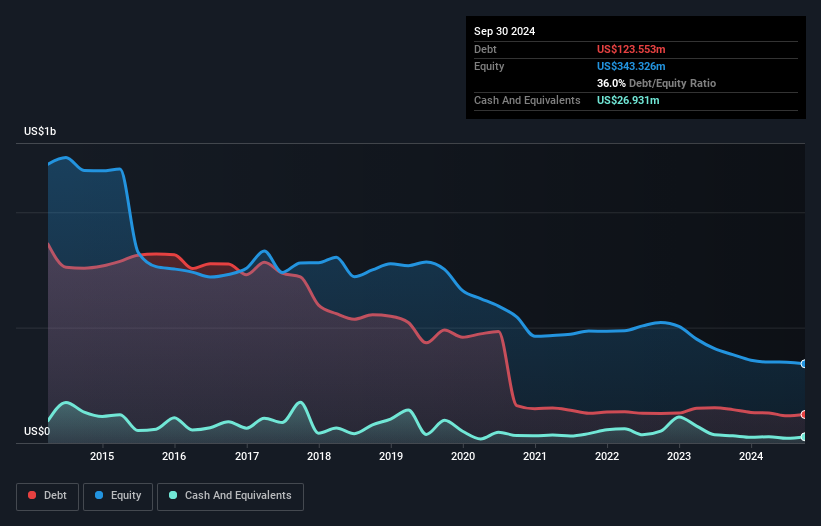The external fund manager backed by Berkshire Hathaway's Charlie Munger, Li Lu, makes no bones about it when he says 'The biggest investment risk is not the volatility of prices, but whether you will suffer a permanent loss of capital.' So it seems the smart money knows that debt - which is usually involved in bankruptcies - is a very important factor, when you assess how risky a company is. As with many other companies Masisa S.A. (SNSE:MASISA) makes use of debt. But is this debt a concern to shareholders?
Why Does Debt Bring Risk?
Debt is a tool to help businesses grow, but if a business is incapable of paying off its lenders, then it exists at their mercy. If things get really bad, the lenders can take control of the business. However, a more common (but still painful) scenario is that it has to raise new equity capital at a low price, thus permanently diluting shareholders. By replacing dilution, though, debt can be an extremely good tool for businesses that need capital to invest in growth at high rates of return. When we think about a company's use of debt, we first look at cash and debt together.
View our latest analysis for Masisa
What Is Masisa's Debt?
You can click the graphic below for the historical numbers, but it shows that Masisa had US$123.6m of debt in September 2024, down from US$144.7m, one year before. However, because it has a cash reserve of US$26.9m, its net debt is less, at about US$96.6m.

How Healthy Is Masisa's Balance Sheet?
The latest balance sheet data shows that Masisa had liabilities of US$140.4m due within a year, and liabilities of US$60.8m falling due after that. On the other hand, it had cash of US$26.9m and US$72.9m worth of receivables due within a year. So it has liabilities totalling US$101.3m more than its cash and near-term receivables, combined.
This is a mountain of leverage relative to its market capitalization of US$106.2m. This suggests shareholders would be heavily diluted if the company needed to shore up its balance sheet in a hurry. The balance sheet is clearly the area to focus on when you are analysing debt. But it is Masisa's earnings that will influence how the balance sheet holds up in the future. So when considering debt, it's definitely worth looking at the earnings trend. Click here for an interactive snapshot.
Over 12 months, Masisa made a loss at the EBIT level, and saw its revenue drop to US$287m, which is a fall of 4.8%. We would much prefer see growth.
Caveat Emptor
Over the last twelve months Masisa produced an earnings before interest and tax (EBIT) loss. Indeed, it lost US$8.9m at the EBIT level. Considering that alongside the liabilities mentioned above does not give us much confidence that company should be using so much debt. Quite frankly we think the balance sheet is far from match-fit, although it could be improved with time. For example, we would not want to see a repeat of last year's loss of US$17m. So in short it's a really risky stock. The balance sheet is clearly the area to focus on when you are analysing debt. But ultimately, every company can contain risks that exist outside of the balance sheet. These risks can be hard to spot. Every company has them, and we've spotted 2 warning signs for Masisa (of which 1 shouldn't be ignored!) you should know about.
When all is said and done, sometimes its easier to focus on companies that don't even need debt. Readers can access a list of growth stocks with zero net debt 100% free, right now.
New: Manage All Your Stock Portfolios in One Place
We've created the ultimate portfolio companion for stock investors, and it's free.
• Connect an unlimited number of Portfolios and see your total in one currency
• Be alerted to new Warning Signs or Risks via email or mobile
• Track the Fair Value of your stocks
Have feedback on this article? Concerned about the content? Get in touch with us directly. Alternatively, email editorial-team (at) simplywallst.com.
This article by Simply Wall St is general in nature. We provide commentary based on historical data and analyst forecasts only using an unbiased methodology and our articles are not intended to be financial advice. It does not constitute a recommendation to buy or sell any stock, and does not take account of your objectives, or your financial situation. We aim to bring you long-term focused analysis driven by fundamental data. Note that our analysis may not factor in the latest price-sensitive company announcements or qualitative material. Simply Wall St has no position in any stocks mentioned.
About SNSE:MASISA
Masisa
Manufactures and sells wooden boards for furniture solutions and interior spaces in Chile, the United States, Peru, Colombia, Ecuador, Canada, China, Vietnam, South Korea, and internationally.
Flawless balance sheet and slightly overvalued.
Market Insights
Community Narratives




